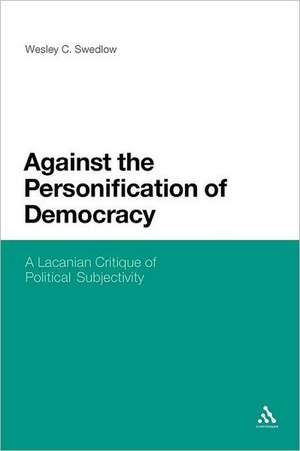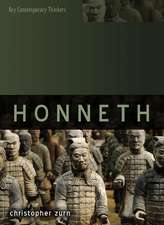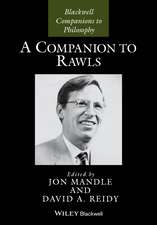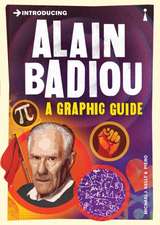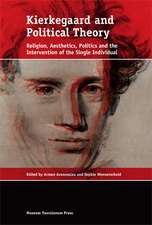Against the Personification of Democracy: A Lacanian Critique of Political Subjectivity
Autor Wesley C. Swedlowen Limba Engleză Paperback – 22 feb 2012
Against the Personification of Democracy offers a new theory of political subjectivity that puts the dilemma of desire into the forefront. By using Lacan to read key figures in political philosophy, the book demonstrates why democratic theory -- representative or radical - is not only ineffective when it comes to the best form of political cohabitation, but also productive of destructive and self-defeating forces.
The book begins with the debate between Hobbesian and Lockeian notions of subjectivity to argue that the nature of political subjectivity is a function of the problem of desire. It then considers the question of the proper structure of political cohabitation in light of Hannah Arendt's insights into what happened to the stateless in World War II, leading to a distinction between the person in a bare and unadorned form and the public persona that is represented in most forms of democracy. Lacan is used to reread the question of political subjectivity, but, unlike radical democratic theory, the book argues against agonistic, representative, and thus endless democracy. Such a political formation is seen as an instigation and ultimate disappointment to desire (the persona), which leads to general negative outcomes, including genocide, concentration camps, and the removal of rights. Arguing against Zizek's proposal that a radical Act can save us politically, the book proposes a universal political formation as the only way out of the dilemma of political desire. This formation is not dependent on public personas, but rooted in actual persons meeting in their locality and sovereign to no one. An indispensable text for anyone interested in political theory, political philosophy, and democratic theory, Against the Personification of Democracy critiques positive theories of sovereignty through its analysis of political subjectivity and the problem of desire. More importantly, it provides a truly universal theory of democratic cohabitation that escapes political desire and thus the scapegoats of democratic failure, not to mention the anxiety of the impossibility of the democratic promise.| Toate formatele și edițiile | Preț | Express |
|---|---|---|
| Paperback (1) | 255.84 lei 6-8 săpt. | |
| Bloomsbury Publishing – 22 feb 2012 | 255.84 lei 6-8 săpt. | |
| Hardback (1) | 888.26 lei 6-8 săpt. | |
| Bloomsbury Publishing – 31 dec 2009 | 888.26 lei 6-8 săpt. |
Preț: 255.84 lei
Preț vechi: 330.33 lei
-23% Nou
Puncte Express: 384
Preț estimativ în valută:
48.96€ • 53.16$ • 41.13£
48.96€ • 53.16$ • 41.13£
Carte tipărită la comandă
Livrare economică 22 aprilie-06 mai
Preluare comenzi: 021 569.72.76
Specificații
ISBN-13: 9781441144157
ISBN-10: 1441144153
Pagini: 206
Dimensiuni: 152 x 229 x 11 mm
Greutate: 0.28 kg
Editura: Bloomsbury Publishing
Colecția Continuum
Locul publicării:New York, United States
ISBN-10: 1441144153
Pagini: 206
Dimensiuni: 152 x 229 x 11 mm
Greutate: 0.28 kg
Editura: Bloomsbury Publishing
Colecția Continuum
Locul publicării:New York, United States
Descriere
Offers a theory of political subjectivity that puts the dilemma of desire into the forefront. By using Lacan to read key figures in political philosophy, this book demonstrates why democratic theory is not only ineffective when it comes to the best form of political cohabitation, but also productive of destructive and self-defeating forces.
Caracteristici
Provides a critical analysis of radical democratic theory and Lacanian political theory as it stands now in the form of Zizek and Stavrakakis.
Cuprins
Introduction: Problems with Reality Chapter 1: Desire & Ideology in the Leviathan1. Rational Action2. Reckoning Reason3. Passion & Power4. Hobbesian Ideological State Apparatuses5. The Politicization of DesireSets up the issue of political subjectivity by reading Hobbes as a thinker of desire and ideology. Argues that Hobbes cannot be read in any sense as a rational choice theorist, but rather as a theorist of irrationality. Establishes desire as central to the question of subjectivity and all political formations.Chapter 2: Internal Externalities1. The Spirit of the Letter2. Money or Life?3. Stateless Nature4. Universal Oblivion5. Biological Violence6. Persona Non GrataStages the debate between Locke and Hobbes in terms of the nature of subjectivity and argues that Hobbes has the better grasp. Grounds this argument through a reading of Arendt's description of the stateless, leading to an analysis of the concept of violence in Arendt's works. Distinguishes the publicly represented persona from the person. Argues that rights and political formations must exist in and for the person, insofar as the state of nature generally corresponds to the person while the political state corresponds to the persona.Chapter 3: The Return of the Political1. Being All That You Can't Be: The Mirror Stage2. Money or Life: Alienation & Existence3. Signifying Nothing4. The Paternal Metaphor & its Phallusy5. Che Voi? From Separation to Desire6. Traversing the Fantasy7. The Return of the PoliticalProposes that the only way to describe the generally vague or unarticulated concepts of desire and drive that work in Hobbes and Arendt is through a Lacanian reading of subjectivity. Shows how Lacanian theory provides a systematic understanding of the nature of desire and drive in subjectivity, thus indicating why representative democracy tends towards its failure in various ways, further promoting the argument that personified democracy, or democracy for a given subject of personas, will tend to produce external persons that can be eradicated in various ways.Chapter 4: The Personification of Democracy 1. The Gutting of the Sovereign: Lefort's Democratic Void2. Laclau & Mouffe's Hegemonic Strategy3. Lacan as Theorist of Democracy4. Only an Act Can Save UsDiscusses radical democratic theory and Lacanian political theory. Provides an overview of the ways in which these theories work and critiques them accordingly. As such, radical democratic theory is shown to merely reinforce the problems of representative democracy outlined earlier, while Zizekian theory is shown to be passive and exclusive, thus disallowing both praxis and a truly universal democracy. Conclusion: Against the Personification of DemocracyTakes the theory of political subjectivity formulated in the previous chapters and, in conjunction with the critique of radical democratic and Zizekian theory, proposes a universal theory of political cohabitation that is anti-sovereign and anti-representative. Notes
